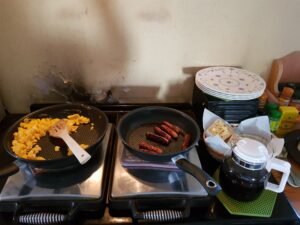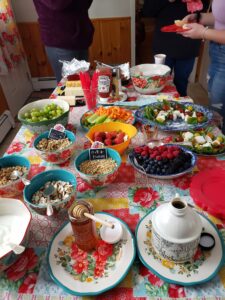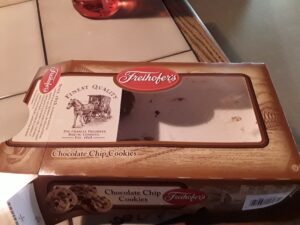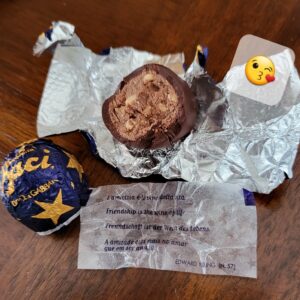Food noise can create a vicious cycle that affects you emotionally and physically. I worry about what to eat, then get stressed about making the right choices, don’t think clearly about what I eat, eat something that causes inflammation and bloating, and the cycle begins again.
I’ve tried several strategies to beat this cycle: psychotherapy, working with various nutritionists, alternative therapists, and coaches, practicing various forms of mindfulness, increasing exercise to increase the pheromones, etc. I’ve picked up valuable ideas and practices from these strategies and think more clearly more frequently, but a couple of “weak moments” and the cycle starts again.
Can you see why I need to put this cycle of food noise behind me?!
How GLP-1 Drugs May Affect The Way You Think About Food
GLP-1s and GIP/GLP-1s are believed to help with weight management in two important ways (Hayes, 2011):
Ro.com, where I get my GLP-1 prescription
They slow down how quickly food leaves your stomach—making you feel full faster and satiated for longer.
They talk directly to the part of your brain in charge of feeling full—helping you regulate how much you eat.”
Some who have taken GLP-1 drugs say that they have experienced reduced “food noise,” i.e., constant, uncontrolled thinking about food. Examples of food noise include excessive thinking about when you will eat next, what you will eat, concern about what you have eaten, etc.
Freedom from food noise is one of the benefits that attracted me to taking these drugs. Struggling with weight, IBS, and an autoimmune disease has me constantly thinking about what to eat or, more appropriately, what not to eat.
Food Noise – My Love/Hate Relationship with Food.

Food as Comfort, Self-Care, Self-Love. We talk about comfort foods, usually in an endearing way, but for many, we use food to comfort ourselves, a form of self-love. If we are sad, lonely, stressed, etc., the food noise starts, and we turn to food, usually foods that cause triggers, to feel emotionally better. We may feel better emotionally in the moment, but then the cycle kicks in, and we feel guilty, shameful, etc.
Ten years ago, I took an online course with Brene Brown based on her book The Gifts of Imperfection. She had us make a list of healthier comforts to have on hand when we needed them. I posted this in my bedroom and on my fridge. The list included nice baths, exercise, listening to music, calling friends, etc. It helped to a point, but it didn’t replace my habit of using food as comfort.

Food as Love for Others. The food noise commences once I start planning for an event or holiday. I use food to show love to others. If I throw a party or event, I want to offer any food guests may want – in abundance. Holidays are a time to spoil the ones I love with food. I spoil my kids with “treats.’ Dating profiles that mention cooking together really appeal to me.
Food Scarcity versus Abundance. My family struggled financially throughout my childhood. My mother, who also had some health issues, was a single mother of four. She did a fantastic job ensuring we had everything we needed, at least on a basic level, but I remember a few disappointing or scary times. There was one Easter when we had no candy. When we’d stay at my father’s house, they had a freezer filled with foods we rarely had at home, like bacon! All of this instilled food with a more complex meaning for me.
Food to Survive. My blood pressure is on the lower side of normal, so sometimes, I get dizzy if I haven’t eaten sufficiently. This issue has come up when I’ve restricted food intake too severely and has given me somewhat of a fear of limiting food intake and, at times, an obsession over eating certain amounts at specific times, which may also have developed from my concern about food scarcity and feelings of food as self-care.

Food Nostalgia. Food often brings up memories of good times, holidays, etc. This nostalgia was especially the case when I lived outside of the US. When we would come back on vacation, I wanted to be sure to have all the foods that I loved that weren’t available in the UK or Ireland, or I’d bring foods from there for my family and friends to try. Anyone who visited us in Ireland knew to bring a big bag of Hershey Kisses! I have trouble resisting the Hershey Almond bars in the supermarket checkout line because my mother loved them and would often pick one up when checking out.
Foodie Culture. I enjoy dining out and trying different restaurants. I also love food and cooking shows. Over the years, I’ve enjoyed many marketing clients involved in the food industry. This love of food and foodie culture often includes eating “off plan.”
For a variety of reasons we don’t fully understand (genetics, temperament, environment), those of us who are compulsive eaters choose food. Not because of its taste. Not because of its texture or its color. We want quantity, volume, bulk. We need it – a lot of it – to go unconscious. To wipe out what’s going on. The unconsciousness is what’s important, not the food.”
“Women Food and God: An Unexpected Path to Almost Everything” by Geneen Roth

Food and Belief. “Women Food and God” by Geneen Roth helped me see these thought patterns more clearly. The book also pointed out that my lack of belief in a higher power affected me in more ways than I realized. This lack of faith in a greater power also led to a lack of faith in myself, making room for food noise to take affect. I didn’t trust myself to make good decisions, especially in certain areas where I lacked role models—food, money, and love.
I can apply healthy foods and healthy amounts of less healthy foods in all these thought patterns, but these thoughts and feelings often trigger unhealthy eating patterns.
Identifying these thought patterns is a starting point for healing from them, but for me and many others, food noise seems impossible to eliminate permanently. Potential freedom from this frustration is an additional attraction of GLP-1 drugs.
Medications with semaglutide, like Ozempic and Wegovy, can help people who experience heightened “food noise” by interfering in the communication between their brain and gastrointestinal system.”
Health.com “What Is ‘Food Noise’? How Drugs Like Ozempic and Wegovy Quiet Obsessive Thoughts About Food”
I am already thinking differently and only entering the third week. I wonder if it’s a placebo effect from starting the GLP-1 drugs or perhaps the effect of writing these articles and discussing this topic with others. I’m excited to see how this progresses and to think about all the other great things I can accomplish with my thinking freed up for other thoughts! I hope this will lead to many positive changes in my life.
I recently decided I am done with ongoing food tracking. It takes so much time and focuses so much on the details of foods and eating. It’s good to start with food tracking to see areas that need improvement, but there’s a time when you must trust your knowledge and instincts.
I wanted to write about food noise early in my GLP-1 weight loss journey to set a benchmark against which to compare my thinking throughout the journey. I have overcome much of the negative thinking and have built some better habits, but it is still present in many ways.
Over the past ten years, I have worked hard to change the mindset that has led to much of the harmful food noise and built more positive habits. I will discuss this work in more detail in the next article.
Take Action!
🌸 Consider what patterns of thinking contribute to your “food noise.”
🌸 Write a page on how these patterns and “food noise” have affected your relationship with food and your body.
🌸 Email me at admin@raisingyourvoice.com with your story. I’d love to hear about your journey!
If you enjoyed this article:
🌸 Share it with any friends you think could benefit from these articles.
🌸 Follow me on social media for more on personal and professional wellness.
🌸 Click here to subscribe to my mailing list to get each new article in your Inbox.